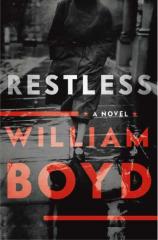Restless
Review
Restless
A government plants phony newspaper articles to exaggerate a distant threat and lure the United States into a foreign conflict. No, it's not a potboiler about the road to the Iraq War. Instead, in RESTLESS, William Boyd has woven a fascinating historical spy thriller from stunning facts revealed only a few years ago about a British propaganda machine whose goal was to persuade a reluctant America to join Britain's fight against Nazi Germany.
As Hitler's armies advanced across Europe after the invasion of Poland in 1939, the overwhelming majority of Americans responded favorably to isolationist calls to keep this country out of war. Philip Roth's 2004 novel, THE PLOT AGAINST AMERICA, vividly imagines that powerful and very real sentiment harnessed to defeat Franklin D. Roosevelt in his quest for a third term and elect Charles Lindbergh on an antiwar platform.
To counter these attitudes, in 1940, with the tacit approval of the Roosevelt administration, the British government established an agency known as British Security Coordination, with an office at Rockefeller Center in the heart of midtown Manhattan. The goal of BSC --- through a network of agents that, at its peak, numbered as many as 3,000 in the United States --- was to spread disinformation intended to mobilize American public opinion to support this country's entry into war. As Boyd describes it, in a recent essay about the novel in The Guardian, "Some of BSC's schemes verged on the absurd; some were highly sophisticated media manipulation."
RESTLESS opens in 1976 in a quiet Oxfordshire village. Sally Gilmartin is living an unassuming life in a small cottage there, tending her garden and enjoying occasional visits from her daughter Ruth, who is fitfully pursuing a graduate degree at Oxford and earning a modest living tutoring foreign students in English to support her young son. Ruth's fear that her mother is exhibiting the early signs of senile dementia gives way to curiosity when Sally hands her a typewritten memoir, entitled THE STORY OF EVA DELECTORSKAYA, and reveals that she's a Russian émigré who had been recruited by a shadowy handler, Lucas Romer, to work in the BSC program. "We all have secrets," Sally says. "No one knows even half the truth about anybody else, however close or intimate they are."
The balance of the novel alternates between Ruth's first-person narrative and Eva's account of her espionage work, told in the third person. Boyd tries to inject some drama into Ruth's story through one subplot featuring her relationship with her student Hamid, a refugee from Iran, and another involving the mysterious appearance of her brother-in-law Ludger and his girlfriend Ilse, who Ruth suspects (without much evidence) may be loosely connected with a German terrorist group. There's little doubt which tale is the more compelling. Eva's tale begins in Paris in 1939, and traces her path from Europe to New York, across the United States to a fateful rendezvous in New Mexico, to Canada and then back to London, where it ends when she meets her husband and Ruth's father, Sean Gilmartin, in 1942.
Eva's early work for BSC, jokingly referred to as "The Rumour Factory," has an almost prankish quality as she concocts fake newspaper stories and poses as a correspondent, all with the goal of heightening American fears about the German threat. But as the tide of war continues to run in Germany's favor and Britain's need to enlist its American ally becomes more desperate, she realizes the game she's involved in is a deadly serious one that may even jeopardize her life.
Ruth works her way through Eva's compelling narrative, acknowledging that "My mother's sudden revelatory detonation had rocked me so powerfully that I had deliberately treated it as a fiction at first, reluctantly letting the dawning truth arrive, filling me slowly, gradually." As she does so, it becomes clear that Sally has shared the story purposefully, hoping to enlist Ruth in her plan to settle an old score with Lucas Romer and reveal a shocking secret about her former handler.
Like the best spy stories, the pleasures of RESTLESS lie as much in the way Boyd illuminates the nuances of human character as in the scenes of heart-pounding action, although there are more than a few of the latter. In this richly satisfying work, he reaffirms his credentials as an accomplished prose craftsman and combines that gift with storytelling skills that will appeal to fans of the best work of masters like Graham Greene and John le Carre.
Reviewed by Harvey Freedenberg(mwn52@aol.com) on January 23, 2011





